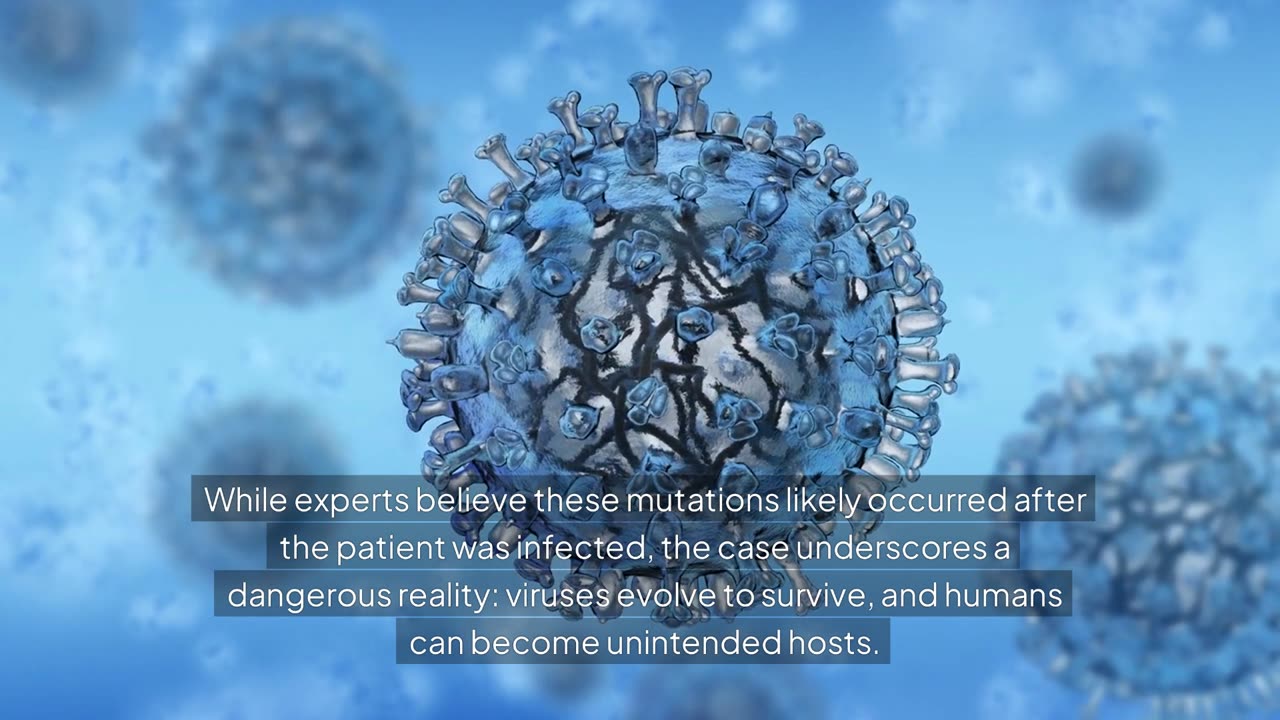Premium Only Content

Bird Flu Arrives in Hawaii: Could This Be a Precursor to a Global Health Crisis?*
---
### **Introduction: A Warning from the Skies**
For the first time, the dreaded bird flu has reached the tropical shores of Hawaii, sparking both concern and curiosity. What brought the virus to this paradise? Officials point to migratory birds as the culprits, yet the broader implications of this outbreak have scientists and residents on edge. Could this be another ominous sign of a virus learning to adapt to humans, or is it just an isolated incident? Let’s dive into the details and explore the rising stakes.
---
### **1. What Is Bird Flu and Why Should You Care?**
Bird flu, officially known as *avian influenza* or H5N1, is a virus that primarily infects birds but occasionally jumps to other animals, including humans. Historically, the virus spread among poultry and wild birds, causing devastating outbreaks in farms worldwide.
The symptoms in humans vary. Most cases result in mild illnesses like red eyes and respiratory symptoms, but some have led to critical conditions. The virus spreads through contact with infected birds’ saliva, nasal secretions, or feces. Alarmingly, when bird flu jumps to mammals or humans, it has the potential to mutate, increasing the risk of human-to-human transmission.
So why is this outbreak in Hawaii significant? Until now, Hawaii was one of only two U.S. states free from bird flu. The arrival of the virus here signals the growing reach of H5N1 and raises the question: How long before it evolves further?
---
### **2. The Hawaii Outbreak: What We Know So Far**
The first confirmed cases in Hawaii were discovered on a backyard farm in Oahu, where ducks, geese, and even a swan tested positive. Officials acted swiftly, culling over 70 birds to prevent further spread. However, this hasn’t eased fears entirely.
Local authorities are urging residents to avoid sick or dead birds and report sightings immediately. While the risk to humans is deemed low for now, the virus’s ability to “hide” in the environment — lingering on shoes, clothing, or equipment — poses a significant challenge to eradication efforts.
The sanctuary founder, Susan Wilkinson, became an unwitting face of the crisis when her entire rescue bird population was euthanized. Her emotional plea for vigilance highlights the devastation this virus can cause, not just to animals but to the humans who care for them.
---
### **3. The Mutation Dilemma: A Virus on the Brink?**
One of the most alarming aspects of bird flu is its ability to mutate. In a recent Canadian case, a teenager was hospitalized with a mutated form of the virus. Researchers believe the mutations occurred after the virus infected the patient, as it adapted to its human host.
Why is this concerning? Every time bird flu jumps to a mammal, it learns more about infecting non-avian hosts. These adaptations could one day lead to sustained human-to-human transmission, creating the potential for a pandemic.
Experts have already observed unusual spillovers, including the virus infecting cows in 2022. This raised red flags, as it showed the virus adapting to an entirely different species. As these spillovers increase, so does the risk of a mutation with global consequences.
---
### **4. Global Spread: A Growing Web of Outbreaks**
Hawaii is the 49th U.S. state to report bird flu in domestic poultry, leaving Louisiana as the last state untouched. Worldwide, the virus has infected over 100 million poultry, 10,000 wild birds, and even 500 dairy herds.
Beyond the U.S., countries like Canada, Japan, and the United Kingdom have reported human cases. Fortunately, most infections in humans remain mild, but health officials stress the need for constant surveillance.
Why has bird flu become so widespread? Migratory birds are key carriers, spreading the virus across continents. Additionally, global trade and travel create opportunities for the virus to move into new regions, as seen with Hawaii.
---
### **5. Fighting Back: Can We Contain Bird Flu?**
Containing bird flu requires a multifaceted approach:
- **Rapid Detection and Reporting:** Early detection is critical. In Hawaii, swift action likely prevented a wider outbreak. Residents play a key role by reporting sick or dead birds.
- **Quarantine Measures:** Infected areas, like Susan Wilkinson’s sanctuary, must be closed off for months to allow the virus to die off naturally.
- **Vaccination and Research:** While poultry vaccines exist, they are not yet widely deployed due to logistical and economic barriers. More research is also needed to develop vaccines for humans in case of a pandemic threat.
- **Public Awareness:** Education campaigns can empower individuals to protect themselves and their communities by avoiding contact with potentially infected animals.
For now, officials maintain that the risk to humans is low, but vigilance remains critical. Each outbreak is a reminder of the delicate balance between humans, animals, and the viruses we share.
---
### **6. What You Can Do: Tips for Staying Safe**
Here’s how you can protect yourself and contribute to the fight against bird flu:
1. **Avoid Contact with Birds:** Do not handle sick or dead birds. Report them to local authorities immediately.
2. **Practice Good Hygiene:** Wash your hands frequently and avoid touching your face after being outdoors.
3. **Stay Informed:** Keep up with updates from reliable sources like the CDC and WHO.
4. **Support Local Efforts:** If you’re in an affected area, follow quarantine guidelines and support local farmers and sanctuaries impacted by the virus.
5. **Advocate for Research:** Push for greater investment in vaccines and treatments to prevent future outbreaks.
---
### **Conclusion: A Global Responsibility**
The arrival of bird flu in Hawaii is more than just a local story. It’s a stark reminder of the interconnectedness of our world and the risks posed by zoonotic diseases — those that jump from animals to humans.
While the risk to the general population remains low for now, the potential for mutation and global spread should not be ignored. We all have a role to play, whether by staying informed, taking precautions, or advocating for equitable healthcare solutions.
Did you find this article helpful? Let us know your thoughts in the comments below! Don’t forget to **like, share, and subscribe** to our channel for more updates on critical global health issues. Together, we can build a healthier, more informed future.
-
 1:15:45
1:15:45
Roseanne Barr
9 hours ago $26.73 earnedJFK case solved!? with Shane Stevens | The Roseanne Barr Podcast #85
99.2K48 -
 10:36:04
10:36:04
Dr Disrespect
15 hours ago🔴LIVE - DR DISRESPECT - PUBG - WHAT WINNING LOOKS LIKE
246K38 -
 4:41:07
4:41:07
Nerdrotic
11 hours ago $34.19 earnedCap 4 and Emelia Perez BACKLASH! Acolyte is Still CANCELED! Hollywood STFU | Friday Night Tights 339
186K31 -
 57:41
57:41
The StoneZONE with Roger Stone
8 hours agoWhy Are They So Afraid of Tulsi Gabbard? | The StoneZONE w/ Roger Stone
51.2K14 -
 2:41:03
2:41:03
I_Came_With_Fire_Podcast
13 hours ago🔥🔥Suing CHINA, Hillary AIDED RUSSIA, and DEI REMOVED from Military🔥🔥
77.5K20 -
 LIVE
LIVE
SoniCentric
14 hours agoCozy Up With SNOWY Lakeside Cabin Jazz Vibes
183 watching -
 1:36:16
1:36:16
PMG
1 day ago $0.83 earnedSPECIAL: JUSTICE FOR JEREMY - NOW!
32.3K4 -
 1:01:01
1:01:01
TheTapeLibrary
16 hours ago $3.40 earnedThe Horrifying True Story of Summerwind Mansion
42.6K7 -
 29:28
29:28
Afshin Rattansi's Going Underground
1 day agoMax Blumenthal on US’ Ukraine Aid Corruption, 'Psychotic' Israel Turning the West Bank into Gaza
45.5K4 -
 57:12
57:12
Flyover Conservatives
1 day agoCovid, Control, & Corruption —Dr. Stella Immanuel’s Plan to BEAT the System! | FOC Show
32.9K